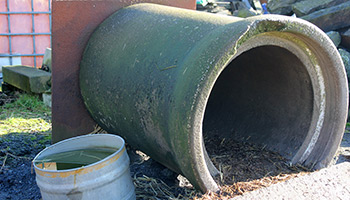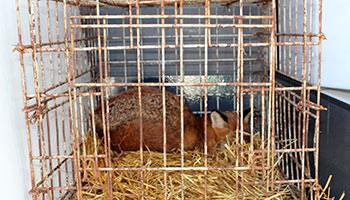Artificial badger sett built to train dogs badger baiting
Our Special Operations Unit led a complex investigation which included filming a group of men setting dogs on a captive badger. Footage recorded showed the badger being attacked by the dogs, mistreated by the men and being stopped from escaping - all causing immense suffering.
The investigators believed that the badger had been placed inside an artificial sett specifically built for the purpose of encouraging dogs to "engage" with wild animals and to fight each other.
The artificial sett comprised of two sewage pipes sunk into the ground, running into connecting chambers that were covered in leaf litter. Large stones and paving slabs were used to block the animals from escaping the chamber. There was no sign of natural badger activity in the area around the site, so it was likely the badger was caught elsewhere and transported there. The second pipe contained no evidence of badgers but had a strong smell of fox. A number of skulls were also found in the area and were likely to be fox and badger.

Multiple foxes and 23 dogs found with multiple injuries
Police executed warrants at two properties. Two captive foxes were found at the first property. It's believed they had been captured for use as bait in the artificial sett. One was housed just a few feet away from a confined terrier which was barking almost continuously.
It was the vet's view that the foxes had sustained severe mental trauma by caging and confining them near the dogs. A subsequent examination of the foxes revealed their teeth were damaged, likely to have been caused by their attempts to escape confinement. Sadly the foxes couldn't be released back to the wild and had to be put to sleep by a vet on welfare grounds.
Also found were dogs living in dirty conditions. In total, 23 dogs comprising of 16 terriers and seven lurcher type dogs were seized. 60 per cent of these bore injuries and scars, consistent with those caused when dogs are engaged in fights with badgers and foxes.

Medicine and equipment used for wildlife crime
Items frequently used by those committing wildlife crime were found including:
- pronged digging tools
- dog locators
- dark clothing
- tools with suspected badger hair on them
- and snares.
Prescription-only medicines that had no dispensing labels were found, suggesting a breach of veterinary medicine regulations. It's thought the medicines were illegally purchased. A skin stapler and stitching materials were also found which would usually only be used by a vet, indicative that one of the defendants was performing surgical repairs on his own dogs' injuries.
A vehicle was seized and searched by the police. It was found to contain many items associated with terrier work, including a veterinary skin stapler, a locator for finding dogs underground, lamping lights and digging equipment.
Evidence extracted from computers and phones revealed the dialogue between the defendants, photos and videos of one of the defendants taunting a captive fox and a video of one of the seized dogs with injuries to its jaw from fighting a badger.
More dogs found at a second property
Eight dogs were found at the second premise, again some with facial wounds, and were seized on welfare grounds. The vet concluded four dogs were caused to suffer due to recent injuries caused in fighting with wild animals, and the failure to seek veterinary attention for these injuries when they occurred. All of the dogs except one were not suitably protected from pain, injuries and disease - and another didn't have its needs met.
180 years after being illegal badger-baiting is still happening
The identities of the five men involved were found and all prosecuted, with four convicted of various offences.
This was a major and landmark investigation in which the RSPCA caught individuals red-handed in the act of using their dogs to barbarically fight with a badger.
Badger-baiting has been illegal for over 180 years and it's sickening to find people still seeking to spend their time inflicting pain, suffering and misery on animals in this way. This was coordinated and carefully planned cruelty.
This prosecution will be a warning to anyone involved in badger baiting activity. Put simply, there is no room for this disgusting activity.
Case outcome
Defendant 1: Pleaded guilty to three offences, two under the Animal Welfare Act 2006 and one under the Protection of Badgers Act 1992. Disqualified from keeping dogs for four years; 10-month referral order and £200 to be paid in costs.
Defendant 2: Pleaded guilty to three offences, two under the Animal Welfare Act 2006 and one under the Protection of Badgers Act 1992. Disqualified from keeping dogs for four years; 10 weeks' imprisonment suspended for 12 months; 150 hours' unpaid work and £600 to be paid in costs.
Defendant 3: Convicted after a trial of seven offences, six under the Animal Welfare Act 2006 and one under the Protection of Badgers Act 1992 and was disqualified from keeping dogs for eight years, 22 weeks' imprisonment; 12-month supervision order post-release and £5,000 to be paid in costs.
Defendant 4: Convicted after a trial of six offences five under the Animal Welfare Act 2006 and one under the Protection of Badgers Act 1992 and was disqualified from keeping dogs for eight years; 20 weeks' imprisonment; 12-month supervision order post-release and £600 to be paid in costs.
